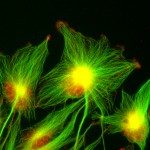Lien vers Pubmed [PMID] – 26726037
Nat. Rev. Mol. Cell Biol. 2016 Feb;17(2):97-109
Collective cell migration has a key role during morphogenesis and during wound healing and tissue renewal in the adult, and it is involved in cancer spreading. In addition to displaying a coordinated migratory behaviour, collectively migrating cells move more efficiently than if they migrated separately, which indicates that a cellular interplay occurs during collective cell migration. In recent years, evidence has accumulated confirming the importance of such intercellular communication and exploring the molecular mechanisms involved. These mechanisms are based both on direct physical interactions, which coordinate the cellular responses, and on the collective cell behaviour that generates an optimal environment for efficient directed migration. The recent studies have described how leader cells at the front of cell groups drive migration and have highlighted the importance of follower cells and cell-cell communication, both between followers and between follower and leader cells, to improve the efficiency of collective movement.

